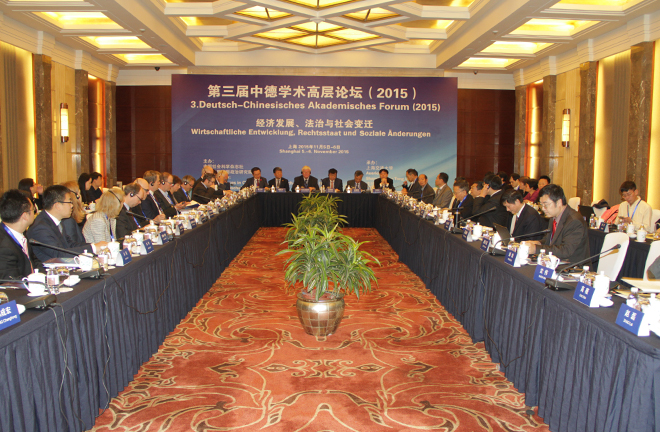Chinese, German scholars explore ways to address changes

The third China-Germany High-Level Academic Forum was held from Nov. 5 to 6 in Shanghai. (PHOTO: CSST)
The third China-Germany High-Level Academic Forum, themed “Economic Development, Rule of Law and Social Changes,” was held from Nov. 5 to 6 in Shanghai. The forum aimed to generate more perspectives for better understanding the development and changes in contemporary China and globalization in the world, thereby having a clearer vision of the rapidly changing future.
One hot topic at the forum was the connection between Germany’s “Industry 4.0” high-tech strategy and “Made in China 2025,” a roadmap for China’s manufacturing sector, which was the focus of German Chancellor Angela Merkel’s eighth China visit in late October.
Bodo Hombach, president of the Bonn Academy for Research and Teaching of Practical Politics, said that China and Europe are both undergoing rapid development and changes. Europe, in particular, is going through upheavals, calling for explanations, reflection, and presenting a reason to seek direct communication with the world.
Finding this reason will help us change our way of thinking and put ourselves in others’ shoes when approaching a problem, he said.
Taking cues from the recently concluded fifth plenum of the 18th Communist Party of China Central Committee, which emphasized “innovation,” scholars engaged in heated discussions about what inspiration Industry 4.0 will offer.
Rudolf Scharping, president of RSBK GmbH, said the Industry 4.0 program is of particular significance to China. As future technologies will help turn China into a world leading industrialized country, the Industry 4.0 strategy will bring huge opportunities for sustainable, successful cooperation between Chinese and German enterprises, he added.
The Industry 4.0 program will offer new ways forward for traditional products, since the digital revolution will significantly influence commodities, services and consumers, said Caja Thimm, a professor of media studies at the University of Bonn.
Jia Genliang, a professor from the School of Economics at Renmin University of China, pointed out the difference between traditional and intelligent industrialization, saying that the nature of intelligent industrialization is to replace manual labor. In this regard, Karl Marx’s machinery and modern industry theory could provide an analytical framework to make sense of Industry 4.0, he said.
At the forum, Chinese and German scholars stressed the importance of facing the impact of digitalization and intelligentization. When attention is paid to innovation and development of Internet finance, it is important to maintain Internet finance security and information security that are crucial to economic security in modern society, they said.
In terms of balancing environmental protection and economic development, Wolfgang Schroeder, a professor of political science at Kassel University in Germany, gave an introduction of the “magical quadrangle” model as discussed by German scholars, which takes into consideration the economy, technology, the environment and society.
Ecology needs economics, he said, adding that the two are not in opposition from a long-term sustainable development perspective. It is necessary to reflect on the green revolution in a broad sense, not only viewing it as a social, cultural and economic program, but as a national plan, he said.
Qin Tianbao, a professor from the School of Law at Wuhan University in Hubei Province, said it is necessary to develop the legal function of environmental law and incorporate the protection of public health, ecological safety and the coordination of multiple interests into the law, in a bid to tackle challenges posed by social transition.
Currently, China and the world must cope with emerging conditions and challenges. Ji Weidong, dean of the Koguan Law School at Fudan University, said that China’s modernization drive and the construction of legal order have been complicated.
“When we found after repeated attempts that a simple goal can never be realized and hardly reflects new trends of globalization, researchers should contemplate and change their way of thinking and analytical methods to bring forth alternative or selectable new plans for tests,” Ji said.
Markus Kaltenborn, a professor of public law at Ruhr University Bochum, emphasized that the form and the essence of rule of law are equally important in a country governed by law. A “substantive rule-of-law country” should first safeguard the rights of its people, he said. In terms of basic social rights and social security law, there are similarities and differences between China and Germany in practice. The experiences the two countries have accumulated will inject important impetus into the development of other countries.
The forum was sponsored by the Social Sciences in China Press under the Chinese Academy of Social Sciences and the Bonn Academy for Research and Teaching of Practical Politics, and hosted by Shanghai Jiaotong University. The fourth session will be held in 2016 in Berlin.
